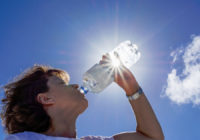Protein is one of the most important nutrients for your body. It’s a crucial part of every single cell in the body, from hair and nails to cartilage and skin. Your body uses protein to produce enzymes, generate hormones, to repair and rebuild damaged tissue.
Protein is made up of stringed amino acids. Some amino acids are produced by your body naturally, whereas others are only gathered through your diet. Those you get from your diet are called essential amino acids.
Animal protein is scientifically proven to provide every essential amino acid: fish, eggs, meat, and dairy. Animal tissue is very similar to ours, so this does make sense.
Like fat and carbohydrates, protein is what’s called a macronutrient. That basically means that the body needs a large amount of it compared to micronutrients, like minerals and vitamins (these are still important!)
However, fat and carbohydrates are stored in the body over extended periods of time. Protein is not.
That doesn’t mean you need to eat as much protein as you can around the clock if you want to see healthy muscle growth. It’s all about striking the right balance and finding protein from better food sources such as plant-based protein as well.
Understanding How Much Protein You Need
Facts and figures around the guaranteed intake of protein differ quite a lot. According to the DRI, the Dietary Reference Intakes, you should be having around 56 grams for the average adult man and 46 for the average adult woman.
However, this becomes more complicated when factoring in a person’s individual lifestyle, their current state of health, their physique goals, and how much they exercise.
The above-recommended intakes are those set for an absolute minimum amount of protein. If you’re looking to improve muscle growth you will need to have more protein in your diet.
Protein in the Diet
Those with a healthy and balanced diet will likely get all the protein they need from the food they eat. Animal protein is the most readily accessible and the most common form of amino acids. Dairy, eggs, meat, and fish all contain plenty of amino acids.
This is why you’ll often see bodybuilders and those looking to improve muscle growth sustain themselves on a diet of chicken, fish, and dairy products. They might combine this with leafy greens, such as spinach. The high protein and low carbohydrate diet is the most popular type of diet in 2020.
It should be noted that you can still get the proteins you need from a vegan diet. It’s certainly more challenging, but there are options such as wheat gluten, tofu, and lentils (and others) which can provide many of the essential amino acids your body needs to stay healthy. A good rule of thumb, if you are not vegan, is to have a good balance of animal and plant-based protein.
Protein and Muscle Growth/Weight Loss
Protein has proven to increase weight loss over a period of roughly six months.
This is because protein speeds up the performance of your metabolism. It will also slowly reduce your appetite, making it less likely you’ll sneak away a few snacks after a workout.
There are some risks associated with this – those who opt for a high protein and low carb diet often forgo fruit and vegetables, which are the best source of vitamins and minerals.
It should also be noted that muscles are made of protein. If you are performing particularly strenuous exercises regularly and want to increase more muscle mass, then you do need to increase your protein intake.
This is because muscle growth is a process of breaking down and repairing muscles as they grow. You need to retain a protein balance in the body, putting in the amount of protein that is put into muscle growth, not just to maintain it.
Healthy Protein Intake in the Long Run – Advice from Your West Vancouver Chiropractor
While protein can help you lose weight and help strengthen your muscles in the short term, it’s good to take a look at the long-term effects of these diets.
However, like most things in life, there are always checks and balances that need to be considered. While bodybuilders will require more protein than the average person because of the constant demand to replenish muscle growth and repair due to heavy weight lifting, eating a lot of animal protein that is not needed for maintaining muscle growth can be dangerous. Some of the possible risks of eating too much protein are:
Kidney Dysfunction
A diet high in proteins means that the kidneys have to work harder to filter out excess nitrogen and wastes from protein metabolism. Those people that have borderline kidney problems should probably avoid a high protein diet.
Dehydration
Together with excess nitrogen excretion is also increased water loss. Greater demand for water excretion is needed to get rid of too much nitrogen. Most of the time you won’t even feel thirsty and so you don’t replenish the water loss. Lack of water in the body will lead to a multitude of other problems like severe muscle cramps, fatigue, frequent illness, constipation, and poor complexion.
Increased Cancer Risk
Diets high in protein particularly red meats and animal fat have a correspondingly high risk in contracting colorectal, breast, and prostate cancers. Instead of ingesting proteins from animal sources, try to select a large portion of your protein intake from vegetable sources instead.
Heart Disease
Getting most of your proteins from animal sources such as red meats and dairy products can increase your risk of heart diseases such as strokes and heart attacks. The increased risks are thought to be linked to higher intakes of saturated fat and cholesterol.
While most protein you can buy from health supplement stores are good quality and have been tested in independent laboratories, it’s always a good idea to do some research on your own online first. There are so many types of protein powders out there however the trick is to find a brand that is not filled with low-quality sources. A good option is to opt for a pure whey isolate mix instead of a whey blend. Whey protein isolate has been filtered more than a Whey Blend and has more of the fats and lactose removed. It allows for better absorption than whey concentrate. People that are lactose intolerant will also find it beneficial to have a cleaner type of protein.
However, protein is also important as the body gets older. As chiropractors, we particularly focus on the effects of a healthy protein diet in terms of conditions like osteoporosis and sarcopenia. Maintaining a healthy and balanced diet with the right balance of good protein will improve general bone health and prevent serious conditions. A piece of good advice from our West Vancouver Chiropractor is to eat a higher percentage of a vegetable-based protein if you would like to increase your protein intake.



